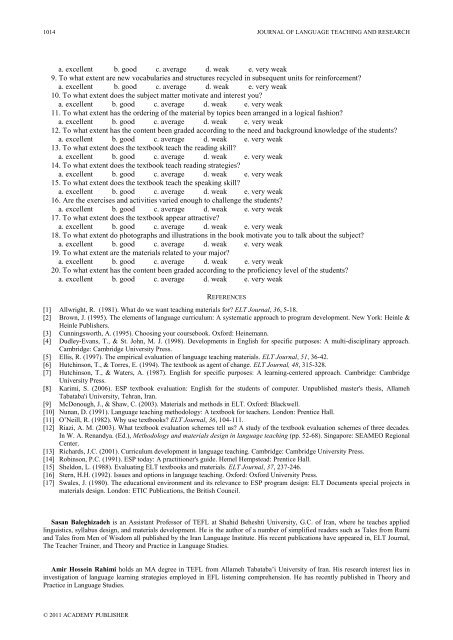Journal of Language Teaching and Research Contents - Academy ...
Journal of Language Teaching and Research Contents - Academy ...
Journal of Language Teaching and Research Contents - Academy ...
Create successful ePaper yourself
Turn your PDF publications into a flip-book with our unique Google optimized e-Paper software.
1014<br />
© 2011 ACADEMY PUBLISHER<br />
JOURNAL OF LANGUAGE TEACHING AND RESEARCH<br />
a. excellent b. good c. average d. weak e. very weak<br />
9. To what extent are new vocabularies <strong>and</strong> structures recycled in subsequent units for reinforcement?<br />
a. excellent b. good c. average d. weak e. very weak<br />
10. To what extent does the subject matter motivate <strong>and</strong> interest you?<br />
a. excellent b. good c. average d. weak e. very weak<br />
11. To what extent has the ordering <strong>of</strong> the material by topics been arranged in a logical fashion?<br />
a. excellent b. good c. average d. weak e. very weak<br />
12. To what extent has the content been graded according to the need <strong>and</strong> background knowledge <strong>of</strong> the students?<br />
a. excellent b. good c. average d. weak e. very weak<br />
13. To what extent does the textbook teach the reading skill?<br />
a. excellent b. good c. average d. weak e. very weak<br />
14. To what extent does the textbook teach reading strategies?<br />
a. excellent b. good c. average d. weak e. very weak<br />
15. To what extent does the textbook teach the speaking skill?<br />
a. excellent b. good c. average d. weak e. very weak<br />
16. Are the exercises <strong>and</strong> activities varied enough to challenge the students?<br />
a. excellent b. good c. average d. weak e. very weak<br />
17. To what extent does the textbook appear attractive?<br />
a. excellent b. good c. average d. weak e. very weak<br />
18. To what extent do photographs <strong>and</strong> illustrations in the book motivate you to talk about the subject?<br />
a. excellent b. good c. average d. weak e. very weak<br />
19. To what extent are the materials related to your major?<br />
a. excellent b. good c. average d. weak e. very weak<br />
20. To what extent has the content been graded according to the pr<strong>of</strong>iciency level <strong>of</strong> the students?<br />
a. excellent b. good c. average d. weak e. very weak<br />
REFERENCES<br />
[1] Allwright, R. (1981). What do we want teaching materials for? ELT <strong>Journal</strong>, 36, 5-18.<br />
[2] Brown, J. (1995). The elements <strong>of</strong> language curriculum: A systematic approach to program development. New York: Heinle &<br />
Heinle Publishers.<br />
[3] Cunningsworth, A. (1995). Choosing your coursebook. Oxford: Heinemann.<br />
[4] Dudley-Evans, T., & St. John, M. J. (1998). Developments in English for specific purposes: A multi-disciplinary approach.<br />
Cambridge: Cambridge University Press.<br />
[5] Ellis, R. (1997). The empirical evaluation <strong>of</strong> language teaching materials. ELT <strong>Journal</strong>, 51, 36-42.<br />
[6] Hutchinson, T., & Torres, E. (1994). The textbook as agent <strong>of</strong> change. ELT <strong>Journal</strong>, 48, 315-328.<br />
[7] Hutchinson, T., & Waters, A. (1987). English for specific purposes: A learning-centered approach. Cambridge: Cambridge<br />
University Press.<br />
[8] Karimi, S. (2006). ESP textbook evaluation: English for the students <strong>of</strong> computer. Unpublished master's thesis, Allameh<br />
Tabataba'i University, Tehran, Iran.<br />
[9] McDonough, J., & Shaw, C. (2003). Materials <strong>and</strong> methods in ELT. Oxford: Blackwell.<br />
[10] Nunan, D. (1991). <strong>Language</strong> teaching methodology: A textbook for teachers. London: Prentice Hall.<br />
[11] O’Neill, R. (1982). Why use textbooks? ELT <strong>Journal</strong>, 36, 104-111.<br />
[12] Riazi, A. M. (2003). What textbook evaluation schemes tell us? A study <strong>of</strong> the textbook evaluation schemes <strong>of</strong> three decades.<br />
In W. A. Ren<strong>and</strong>ya. (Ed.), Methodology <strong>and</strong> materials design in language teaching (pp. 52-68). Singapore: SEAMEO Regional<br />
Center.<br />
[13] Richards, J.C. (2001). Curriculum development in language teaching. Cambridge: Cambridge University Press.<br />
[14] Robinson, P.C. (1991). ESP today: A practitioner's guide. Hemel Hempstead: Prentice Hall.<br />
[15] Sheldon, L. (1988). Evaluating ELT textbooks <strong>and</strong> materials. ELT <strong>Journal</strong>, 37, 237-246.<br />
[16] Stern, H.H. (1992). Issues <strong>and</strong> options in language teaching. Oxford: Oxford University Press.<br />
[17] Swales, J. (1980). The educational environment <strong>and</strong> its relevance to ESP program design: ELT Documents special projects in<br />
materials design. London: ETIC Publications, the British Council.<br />
Sasan Baleghizadeh is an Assistant Pr<strong>of</strong>essor <strong>of</strong> TEFL at Shahid Beheshti University, G.C. <strong>of</strong> Iran, where he teaches applied<br />
linguistics, syllabus design, <strong>and</strong> materials development. He is the author <strong>of</strong> a number <strong>of</strong> simplified readers such as Tales from Rumi<br />
<strong>and</strong> Tales from Men <strong>of</strong> Wisdom all published by the Iran <strong>Language</strong> Institute. His recent publications have appeared in, ELT <strong>Journal</strong>,<br />
The Teacher Trainer, <strong>and</strong> Theory <strong>and</strong> Practice in <strong>Language</strong> Studies.<br />
Amir Hossein Rahimi holds an MA degree in TEFL from Allameh Tabataba’i University <strong>of</strong> Iran. His research interest lies in<br />
investigation <strong>of</strong> language learning strategies employed in EFL listening comprehension. He has recently published in Theory <strong>and</strong><br />
Practice in <strong>Language</strong> Studies.

















